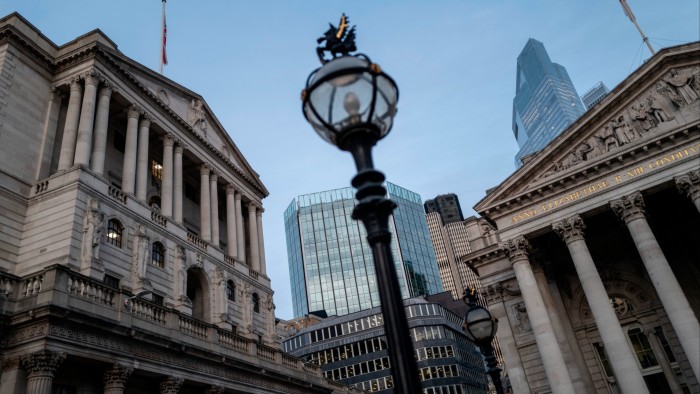Stay informed with free updates
Simply sign up to the UK interest rates myFT Digest — delivered directly to your inbox.
The Bank of England may need to cut interest rates as many as five or six times over the coming year because of the stalling economy, a UK policymaker has warned, as he urged the central bank to take action to secure a “soft landing”.
Alan Taylor, an external member of the Monetary Policy Committee, said on Wednesday that the BoE’s “gradual” approach to rate reductions implied four quarter-point cuts by the end of 2025, taking the cost of borrowing to 3.75 per cent.
But in a speech he warned of an increasing risk that the weakening economy would need a “more accelerated pace of rate cuts” that would lead the BoE’s benchmark rate to fall by 1.25 or 1.5 percentage points in the next 12 months.
“The most recent data and forward-looking activity indicators present an increasingly gloomy outlook for 2025,” Taylor told an audience at Leeds University Business School, citing figures on GDP and business sentiment.
“We are in the last half-mile on inflation, but with the economy weakening, it’s time to get interest rates back toward normal to sustain a soft landing,” he added, describing a scenario in which price growth returns to the BoE’s 2 per cent target without a recession.
Taylor’s downbeat assessment comes after he joined a minority vote for a further rate cut last month, in addition to the two reductions the central bank pushed through in 2024.
The BoE, which has predicted the UK economy will have failed to grow in the final quarter of last year, is widely expected to make a further quarter-point reduction at its next meeting in February.
The cut would take rates to 4.5 per cent, and beyond then markets expect a further quarter-point rate reduction in 2025.
The outlook beyond February is less clear because of mixed signals on inflation and the uncertain impact of chancellor Rachel Reeves’ October budget on labour costs and prices.
Gilt prices rallied on Wednesday after official data offered some reprieve on inflation, with the headline rate slipping back to 2.5 per cent and services price growth falling sharply in December.
Six or 12 months ago, Taylor said, there were still reasons to fear that inflation had become entrenched in the UK economy, owing to lasting changes in the way businesses set prices and wages, and the rate of unemployment consistent with 2 per cent inflation.
This is one of three scenarios, or “cases”, the MPC has been considering. If borne out by the evidence, it is one that would require policymakers to keep interest rates higher for longer to squeeze inflationary pressures out of the system.
“Right now is quite different,” Taylor said, noting that it looked more likely the MPC’s more benign case was playing out. In that scenario, the economy had returned to its normal steady state, with only gradual rate cuts needed to return inflation to target in a timely manner.
But if the current situation worsened it could require faster, deeper cuts in interest rates than the MPC has been envisaging, he said, calling on fellow policymakers to “watch closely for signs of ebbing confidence”.
Most expansions, said Taylor, who joined the MPC last year, were a “gradual climb up the stairs; but recessions can take hold quickly, sentiment can chill and the descent is more like taking the elevator shaft.”
Catalysts for this adverse scenario could include new trade wars, he said, but the biggest domestic concern was of a new cash flow squeeze that was “already being felt by both businesses and households on various fronts”.
“If some sudden essential costs rise, like taxes or debt service, then something else has to give,” Taylor added, referring to the impending rise in employer national insurance contributions, and the effects of higher interest rates on mortgage repayments.
Recent data suggested an “increasingly gloomy outlook for 2025”, he said, adding: “The labour market is near balance, but is still loosening at pace, GDP growth appears to have ground to a halt in the second half of 2024, and with . . . business expectations veering to the pessimistic, in my view the risks are now more skewed to the downside.”
Taylor joined fellow external MPC member Swati Dhingra and BoE deputy governor Dave Ramsden in voting for an immediate quarter-point rate reduction at the December meeting.
A majority of the nine-member committee voted for interest rates to be held at 4.75 per cent, with BoE governor Andrew Bailey saying “a gradual approach to future interest rate cuts remains right”.
Source link









